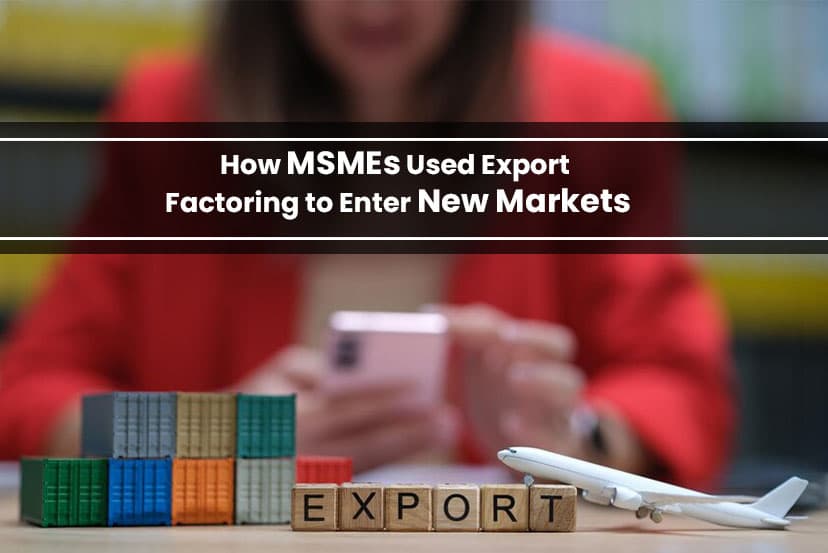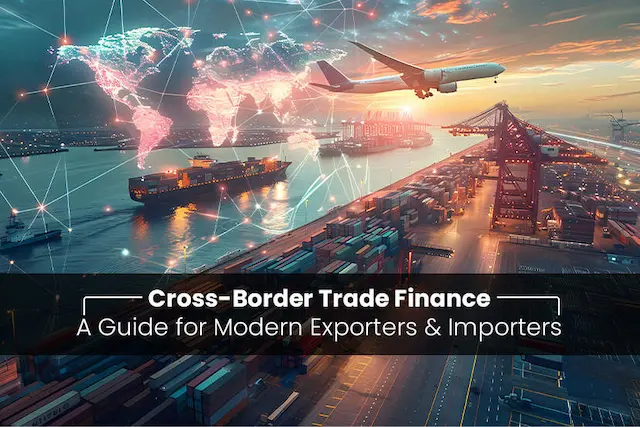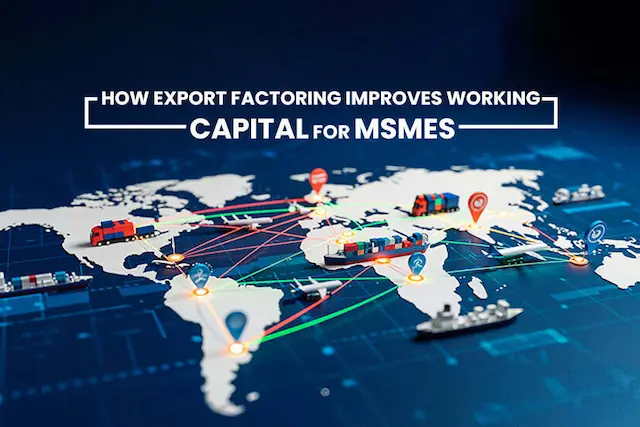In today’s rapidly globalised world, the Indian Micro, Small, and Medium Enterprises (MSMEs) can easily explore international markets. They are venturing into new global markets and capturing the export market in various sectors, including textiles, auto parts, electronics, and agro-based products. However, there is one issue that usually becomes an obstacle: working capital. That is why export factoring has emerged as an effective financial way that has helped such businesses access the international markets without straining their budget.
What Is Export Factoring?
Export factoring is another short-term source of finances in the form of export; an exporter can sell their accounts receivable abroad, at a discount, to a third party (the factor). As a trade-off off the exporter receives the cash immediately, usually 80-90 per cent of the invoice amount. After the overseas buyer makes the payment to the factor, the remaining amount (less the service commission) is paid to the exporter.
The tool eliminates the guesswork in the long payment period and enhances liquidity. It helps businesses to concentrate on growth, as opposed to collection.
Why MSMEs Rely on Export Factoring
Various businesses, such as MSMEs, do not have a monetary cushion or credit lines to support lengthy international payment terms.
Export factoring has helped such businesses in –
- Turn accounts receivable into instant liquidity
- Provide competitive terms of credit to foreign buyers
- Strengthen cash flow to compete with bigger or repetitive orders
- Eliminate the chance of buyer defaults through non-recourse factoring
This is why, in most situations, the small exporters can compete with the international players and enter the challenging foreign markets.
Case in Point: Agro-Based MSMEs Scaling Up
Consider the example of a medium-sized spices exporter in Kerala. Before export factoring, there was the cash flow strain, dealing with at least 90 days of payments with buyers from Europe. Factoring helped them receive money within 3-5 days of shipping, and with this, they had the working capital to take on larger orders.
The increased cash flow has helped them venture into new product lines such as organic turmeric and cumin, securing shelf space in new countries such as Germany and the Netherlands.
How Export Factoring Helps in Market Entry
Here’s how MSMEs use export factoring as a gateway to global markets –
- Facilitates Better Credit Terms
New markets have a lot of unfamiliar buyers. Terms of open credit (30- or 60-day payments, etc.) help in bringing new customers, and at the same time strain finances. Factoring closes this gap as it provides MSMEs with the upfront capital while still accommodating the buyer.
- Reduces Dependency on Collateral-Based Loans
The majority of the traditional lending sources demand an asset or fixed security, something most MSMEs cannot afford. The export factoring bypasses this provision, which allows more businesses to have access to the facility.
- Mitigates Payment and Currency Risks
Many factors provide non-recourse factoring, which implies that the risks of non-payment of buyers who become insolvent are taken over. Some also offer currency protection for the MSME so that the money fluctuations are hedged against when invoices are in dollars or euros.
- Allows Focusing on Growth
The money in the receivables is not used to stimulate growth. By factoring, the MSMEs will be able to invest back into their inventory, marketing, staff, and logistics at once, and speed up their market entry and growth activities.
- Enhances Bargaining Power
Confidence is increased by the guarantee of cash flow. With factoring, MSMEs can upgrade procurement terms with the suppliers or invest in R&D to tailor the products to appeal to foreign buyers–an advantage to position themselves in the new market.
Structured Process, Simple Execution
Export factoring can be a pretty complicated term, but the procedure itself does not have to be –
- Issuance of Invoice – The MSME makes a goods shipment and creates an export bill.
- Invoice Submission – The invoice is mailed to the factor.
- Immediate Payment- The factor releases up to 90 per cent of the value of the invoice.
- Buyer Repayment – The foreign buyer makes full repayment of the factor.
- Balance Settlement – The factor sends the balance amount to the exporter.
Many digital portals offer this service completely online and thus are even more MSME-friendly.
Want to know how much working capital you can unlock through factoring? Try our quick Factoring Interest Calculator. [Calculate Now]
Why It’s Gaining Popularity Among Indian MSMEs
The increase in the use of export factoring in India can be attributed to several factors:
- Government encouragement for export diversification:
- Rise of Digital factoring platforms
- More awareness by trade bodies and chambers
- Convenience of onboarding even for first-time exporters
- Tailored options such as recourse or non-recourse, domestic or international factoring
Factoring is increasingly becoming a standard part of the export finance toolbox as many Indian MSMEs turn to digital solutions and start investigating demand abroad.
Final Word: A Smart Bridge to Global Growth
Export factoring is not merely a financial product but a strategy enabler. This model provides instant access to working capital, risk aversion, and flexibility to the MSMEs that seek to tap into new markets. It enables companies to present more favourable terms, grab new opportunities, and stay in cash flow without borrowing in a traditional way. In a world where timing and trust are everything, factoring offers speed and credibility that Indian exporters require to establish themselves on a global scale.
The conventional technology of managing finances involved in the export of MSMEs in India is being challenged and changed by platforms such as Credlix. Credlix provides export factoring and invoice discounting to enable companies to get working capital quicker and take calculated risks into new markets. Credlix presents an opportunity to exporters seeking to expand internationally by being a secure financial partner in their global business quest.
FAQs
Q1: Does export factoring apply to big companies only?
No, especially beneficial for MSMEs who have had little access to bank loans, or those with long payment cycles by international buyers.
Q2: Which are the types of exports that can be export factored?
The most tangible items like textiles, auto parts, agricultural products, and electronics. Depending on the factoring partner, some services can be qualified as well.
Q3: What is the turnaround time of funds?
Exporters normally get up to 90 per cent of the invoice amount after a period of 48-72 hours of filling, depending on both the platform and readiness to submit documents.
Don’t let delayed overseas payments stop your growth. Access instant funds with Export Factoring for MSMEs.




